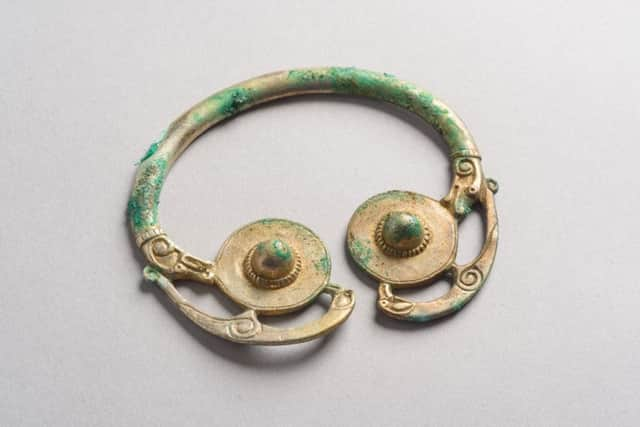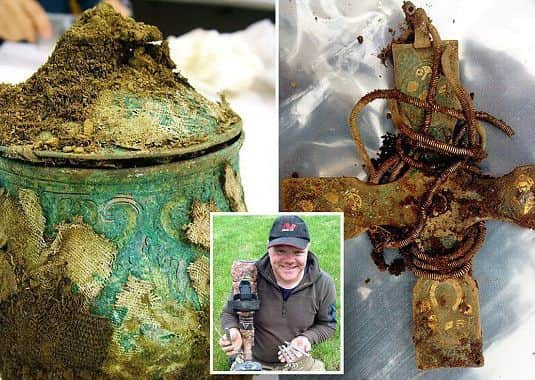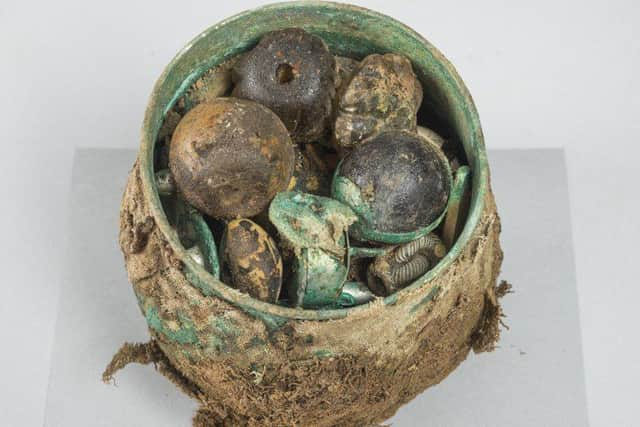Kirk set for windfall after £2m Viking treasure find


Metal detectorist Derek McLennan will receive £1.98m for the internationally important collection which he found in the grounds of a church at a secret location in Dumfries and Galloway in 2014.
The find has been hailed as a collection of international importance and is around 1,000-years-old.
Advertisement
Hide AdAdvertisement
Hide Ad

It includes an early Christian cross dating to the 9th or 10th century and around 100 other artefacts including arms pieces, a gold bird-shaped pin, silver and crystal, many which were found in Carolingian pot with a lid.
The the Queen’s and Lord Treasurer’s Remembrancer (QLTR) announced last week it would allocate the find to National Museums Scotland if it can raise £1.98m to pay Mr McLennan.
Mr McLennan, who was metal detecting with two minister from the Church of Scotland at the time of the find, has an “agreement” with the Kirk to share his fee.


A Church of Scotland spokesman said: “The Church has worked closely with the finder ever since the hoard was first unearthed on church land three years ago and agreed an equitable share of its value.”
Advertisement
Hide AdAdvertisement
Hide AdIt has not been confirmed how much the Church of Scotland will receive, with discussions ongoing.
In Scotland, it is at the discretion of the metal detectorist if payments are made to the landowner following a find.
Mr McLennan was with Rev Dr David Bartholomew, a Church of Scotland minister of a rural Galloway charge, and Mike Smith, the pastor of an Elim Pentecostal Church in Galloway, who are both keen metal detectorists, at the time the Viking hoard was discovered.


The two ministers had been at another part of the search site when Mr McLennan ran over to them waving a silver arm piece shouting “Viking!”
Advertisement
Hide AdAdvertisement
Hide AdRev Dr Bartholomew earlier described a “heart stoppping” moment when an archaeologist was called into the site to inspect the finds more closely.
The church spokesman added: “We and the finders have an interest in promoting the responsible code of conduct through which metal detectorists and landowners can properly engage with each other so people can enjoy this hobby.
“If detectorists get appropriate permission from landowners before they access the land, then dealing with major finds such as this becomes a great deal easier for everyone.


“We believe that the relationship we have struck in arranging access to the land, registering the find and sharing in the sense of achievement is a textbook example of how this should be done.
Advertisement
Hide AdAdvertisement
Hide Ad“We are pleased the authorities have formally recognised this in their comments.
“The financial reward is just one aspect of what continues to be our very exciting and unexpected journey together.”
Campaigners in Dumfries and Galloway had been working to keep the collection in the area and put it on local display.
They were “deeply disappointed” at the decision to allocate the find to the Edinburgh museum given it could be “potentially lost” among the other “wonderful artefacts” on show.
National Museum of Scotland now has six months to find the funds to secure the hoard.
Mr McLennan could not be reached for a comment.
